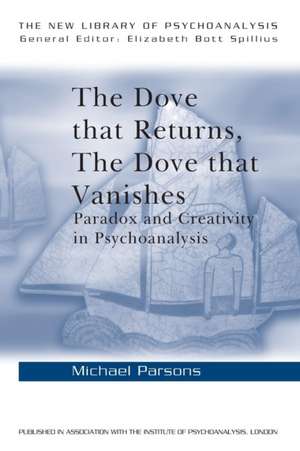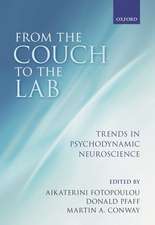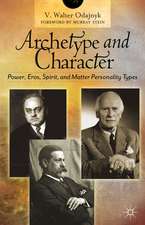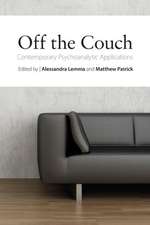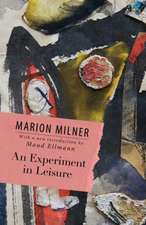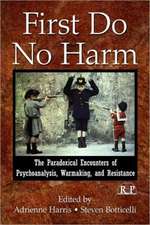The Dove that Returns, The Dove that Vanishes: Paradox and Creativity in Psychoanalysis: The New Library of Psychoanalysis
Autor Michael Parsonsen Limba Engleză Paperback – 11 mai 2000
In The Dove that Returns, The Dove that Vanishes, Michael Parsons explores the tension of this paradox. As they respond to it and struggle to sustain creatively, analysts discover their individual identities. The work of outstanding clinicians such as Marion Milner and John Klauber is examined in detail. The reader also encounters oriental martial arts, greek Tragedy, the landscape painting of John Constable, a Winnicottian theory of creativity and a discussion of the significance of play in psychoanalysis. From such varied topics evolves a deepening apprehension of the nature of the clinical experience.
Illustrated throughout , The Dove that Returns, The Dove that Vanishes will prove valuable to those in the field of psychoanalysis, and to those in the arts and humanities who are interested in contemporary psychoanalytic thinking.
| Toate formatele și edițiile | Preț | Express |
|---|---|---|
| Paperback (1) | 382.02 lei 6-8 săpt. | |
| Taylor & Francis – 11 mai 2000 | 382.02 lei 6-8 săpt. | |
| Hardback (1) | 1288.69 lei 6-8 săpt. | |
| Taylor & Francis – 11 mai 2000 | 1288.69 lei 6-8 săpt. |
Din seria The New Library of Psychoanalysis
- 5%
 Preț: 293.44 lei
Preț: 293.44 lei - 5%
 Preț: 331.64 lei
Preț: 331.64 lei - 5%
 Preț: 286.68 lei
Preț: 286.68 lei - 5%
 Preț: 295.02 lei
Preț: 295.02 lei - 5%
 Preț: 298.13 lei
Preț: 298.13 lei - 5%
 Preț: 250.75 lei
Preț: 250.75 lei - 5%
 Preț: 294.02 lei
Preț: 294.02 lei - 5%
 Preț: 233.65 lei
Preț: 233.65 lei - 5%
 Preț: 273.04 lei
Preț: 273.04 lei - 5%
 Preț: 344.75 lei
Preț: 344.75 lei -
 Preț: 295.40 lei
Preț: 295.40 lei - 5%
 Preț: 295.21 lei
Preț: 295.21 lei - 5%
 Preț: 762.85 lei
Preț: 762.85 lei - 5%
 Preț: 373.84 lei
Preț: 373.84 lei - 5%
 Preț: 333.69 lei
Preț: 333.69 lei - 5%
 Preț: 233.59 lei
Preț: 233.59 lei - 5%
 Preț: 231.82 lei
Preț: 231.82 lei - 5%
 Preț: 264.13 lei
Preț: 264.13 lei - 5%
 Preț: 266.39 lei
Preț: 266.39 lei - 5%
 Preț: 295.41 lei
Preț: 295.41 lei - 5%
 Preț: 296.08 lei
Preț: 296.08 lei -
 Preț: 294.23 lei
Preț: 294.23 lei - 5%
 Preț: 316.84 lei
Preț: 316.84 lei - 5%
 Preț: 289.19 lei
Preț: 289.19 lei - 5%
 Preț: 282.40 lei
Preț: 282.40 lei - 5%
 Preț: 287.54 lei
Preț: 287.54 lei - 5%
 Preț: 280.59 lei
Preț: 280.59 lei -
 Preț: 347.67 lei
Preț: 347.67 lei -
 Preț: 336.84 lei
Preț: 336.84 lei - 5%
 Preț: 349.43 lei
Preț: 349.43 lei - 5%
 Preț: 259.78 lei
Preț: 259.78 lei - 5%
 Preț: 260.93 lei
Preț: 260.93 lei - 5%
 Preț: 219.54 lei
Preț: 219.54 lei - 5%
 Preț: 218.59 lei
Preț: 218.59 lei - 5%
 Preț: 234.36 lei
Preț: 234.36 lei - 5%
 Preț: 235.04 lei
Preț: 235.04 lei - 5%
 Preț: 233.05 lei
Preț: 233.05 lei - 5%
 Preț: 253.71 lei
Preț: 253.71 lei - 5%
 Preț: 234.72 lei
Preț: 234.72 lei -
 Preț: 309.79 lei
Preț: 309.79 lei - 5%
 Preț: 294.71 lei
Preț: 294.71 lei - 5%
 Preț: 259.71 lei
Preț: 259.71 lei - 5%
 Preț: 287.94 lei
Preț: 287.94 lei - 21%
 Preț: 811.99 lei
Preț: 811.99 lei - 19%
 Preț: 246.34 lei
Preț: 246.34 lei - 5%
 Preț: 362.47 lei
Preț: 362.47 lei - 5%
 Preț: 367.79 lei
Preț: 367.79 lei - 11%
 Preț: 278.48 lei
Preț: 278.48 lei - 5%
 Preț: 365.37 lei
Preț: 365.37 lei
Preț: 382.02 lei
Preț vechi: 402.13 lei
-5% Nou
Puncte Express: 573
Preț estimativ în valută:
73.10€ • 76.53$ • 60.48£
73.10€ • 76.53$ • 60.48£
Carte tipărită la comandă
Livrare economică 05-19 aprilie
Preluare comenzi: 021 569.72.76
Specificații
ISBN-13: 9780415211826
ISBN-10: 0415211824
Pagini: 240
Dimensiuni: 156 x 234 x 11 mm
Greutate: 0.44 kg
Ediția:1
Editura: Taylor & Francis
Colecția Routledge
Seria The New Library of Psychoanalysis
Locul publicării:Oxford, United Kingdom
ISBN-10: 0415211824
Pagini: 240
Dimensiuni: 156 x 234 x 11 mm
Greutate: 0.44 kg
Ediția:1
Editura: Taylor & Francis
Colecția Routledge
Seria The New Library of Psychoanalysis
Locul publicării:Oxford, United Kingdom
Public țintă
Postgraduate and ProfessionalCuprins
Introduction. Part I: Rigour and Freedom. Vocation and Martial Art. The Other in the Self. Suddenly Finding it Really Matters. Refinding Theory in Clinical Practice. Psychoanalytic and Personal Identity: The Garden of Forking Paths. Part II: Loss, Acceptance, Creativity. Self-knowledge Refused and Accepted: Euripides' Bacchae and Sophocles' Oedipus at Colonus. The Oedipus Complex as a Lifelong Developmental Process: Sophocles' Trachiniae. The Logic of Play. Creativity, Psychoanalytic and Artistic. Psychic Reality, Negation and the Analytic Setting. Conclusion. The Dove That Returns, The Dove That Vanishes. Index.
Notă biografică
Michael Parsons is a training analyst of the British Psycho-Analytical Society and a member of the International Psychoanalytical Association. He works in private practice in London.
Recenzii
"Few books that I know are a panoramic, kaleidoscopic, dialectically based and aphoristic as Michael Parson's The Dove that Returns, The Dove that Vanishes... a book whose style is beyond question and whose message is profoundly meaningful. This is compromised of a sustained elucidation of the paradoxical nature of our clinical work, our theories and indeed our very identities as psychoanalysts. In all these realms, Parsons presents arguments to contain polarities of deliberateness and spontaneity, knowledge and surprise, credulousness and skepticism, and discipline and freedom." - Salman Akhtar, The International Journal of Psychoanalysis, Volume 83
"Whatever their theoretical allegiance, everyone who reads this impressive book will be enriched by the experience." - Margaret Arden, The Psychotherapy Review
"... a book of clarity and poignancy... This is a very highly recommended book both because of the importance of Parsons's ideas, and because of his engaging and moving manner of telling a story." - Steven Cooper, JAPA, Vol 50 No 3, 2002
"Whatever their theoretical allegiance, everyone who reads this impressive book will be enriched by the experience." - Margaret Arden, The Psychotherapy Review
"... a book of clarity and poignancy... This is a very highly recommended book both because of the importance of Parsons's ideas, and because of his engaging and moving manner of telling a story." - Steven Cooper, JAPA, Vol 50 No 3, 2002
Descriere
Explores how analysts struggle with the contradictory nature of psychoanalysis - deeply personal, subjective and intuitive, yet dependant on systematic theory and objective principles of technique.
